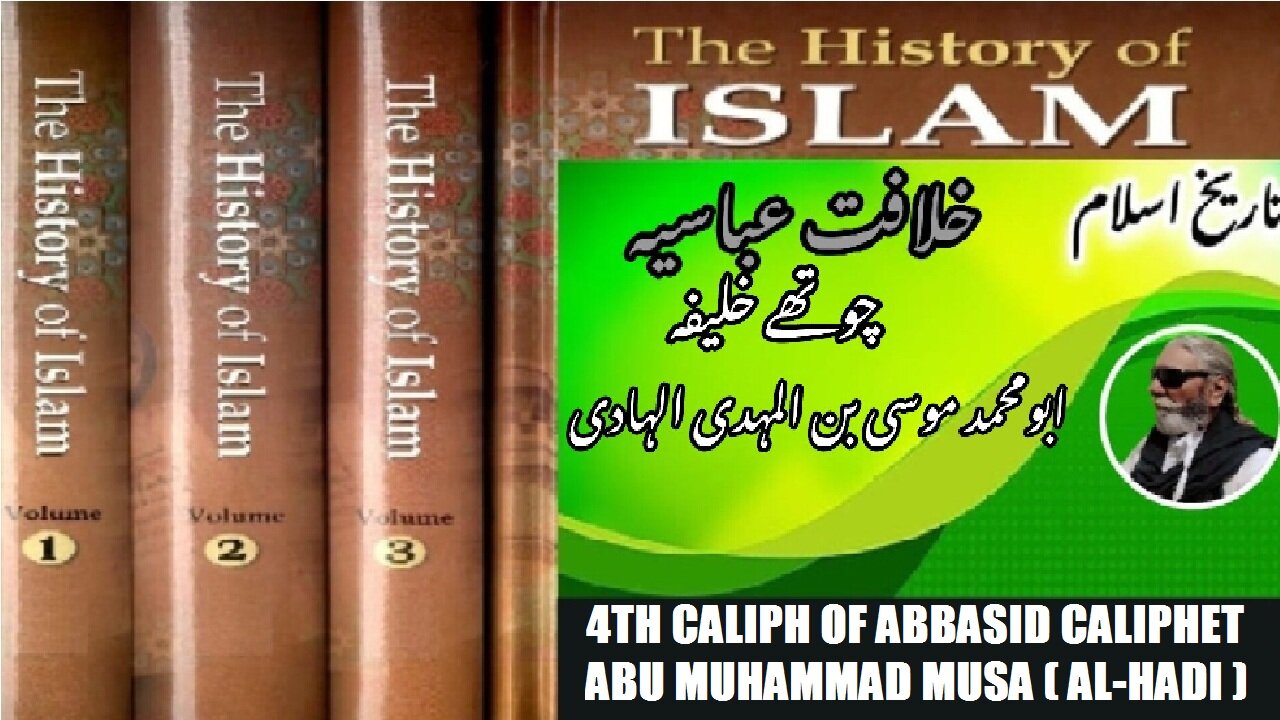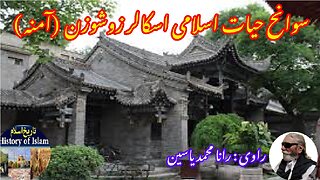Premium Only Content

4th Caliph of Abbasid Caliphate Abu Muhammad Musa ibn al-Mahdi al-Hadi
@islamichistory813 #AbuMuhammadMusa #AbbasidCaliphate #IslamicHistory #EducationalVideo
Fourth Caliph of Abbasid Caliphet Abu Muhammad Musa ibn al-Mahdi al-Hadi
Asslamoalaikum sisters friends brothers and elders, today we are present history with our latest educational and informative video on Abu Muhammad Musa ibn al-Mahdi al-Hadi, the Fourth Caliph of the Abbasid Caliphate. will be discribed the significant events and contributions of his reign, and unravel fascinating insights about one of the pivotal leaders in Islamic history. Whether you are a history enthusiast or a student, this video will enrich your knowledge and understanding of the Abbasid Caliphate. Don’t forget to like, comment, and share this video with others to spread the knowledge!
Abu Muhammad Musa ibn al-Mahdi al-Hadi better known by his laqab al-Hadi was the fourth Arab Abbasid caliph who succeeded his father al-Mahdi and ruled from 169 AH (785 CE) until his death in 170 AH (786 CE). His short reign ended with internal chaos and power struggles with his mother
Al-Hadi was born in 764. His father was al-Mahdi and al-Khayzuran bint Atta was the mother of both caliphs Musa al-Hadi and Harun al-Rashid.[3] She had another son named Isa ibn al-Mahdi,[4] and a daughter named Banuqah or Banujah.[5] His mother, al-Khayzuran was born in Mecca and brought up in Jurash.[6] She had two sisters, Salsal bint Atta[7] and Asma bint Atta,[4] and a brother Ghitrif ibn Atta.[7] She was al-Mahdi's favourite wife. Al-Mahdi consulted her on important matters of defense and administration, and officers and clerics went to her door day and night to get what they wanted from the caliph through her, and the petitioners lined up outside her door and it was crowded like a market. Khayzuran's influence in public and political life increased gradually from interferer and decisive incursions during the reign of her husband to more powerful and wider ones during the reigns of her two sons.[8] Al-Hadi also had several half-brothers; Ubaydallah, Ibrahim, Mansur, Ali, Abdallah. He also had half-sisters; Abbasa was his elder half-sister, others were Ulayya and Aliyah.
Al-Hadi was the eldest son of al-Mahdi and al-Khayzuran and the older brother of Harun al-Rashid. He was very dear to his father and was appointed as the first crown prince by his father at the age of 16 and was chosen as the leader of the army.[9] Prior to his death, al-Mahdi supposedly favored his second son, Harun al-Rashid, as his successor, taking him on multiple military expeditions in 779 and 781 to train him to be the next caliph, as his own father prepared him, but died before the formal transfer of the crown prince title could occur. Not to mention, their mother, Khayzuran played a driver in these thoughts of al-Mahdi and was a partner. Alternatively, al-Rashid was a general and may have accompanied his father to war to train for and carry out his profession.
Caliphate
Regardless of the intent, in 785, Al-Mahdi died during an expedition with his son Harun, who rushed back to Baghdad to inform his mother. At al-Mahdi's untimely death, Khayzuran took control of the situation. She ensured a smooth transition of power and to secure the succession for her son, she called upon the viziers and ordered them to pay the wages of the army to secure order, and then had them swear allegiance to her son as their new caliph in his absence, and held everything together until al-Hadi returned to Baghdad. Al-Hadi became the caliph at the age of 25, the youngest caliph to yet rule the Abbasids. His brother Harun al-Rashid became his crown prince at 22. This was a point of insecurity for al-Hadi as he spent the majority of his rule attempting to wrest the title of crown prince from al-Rashid - whether he was granted it before or after his father's death - and install his 7-year-old son Ja'far in his place. As Ja'far was very young and it went against law and wisdom to install him as crown prince, al-Hadi tried to put pressure on Harun and convince him to resign himself. So, Harun escaped from the capital and did not return there until the end of his brother's life. However, al-Hadi's attempt to depose his brother caused further conflict between him and his mother Khayzuran, as they each strove for their respective sons to become the next caliph: al-Hadi for Ja'far and Khayzuran for Harun.[10]
Al-Hadi was considered an "enlightened ruler" by his constituents and continued the "progressive" moves of his Abbasids predecessor. Like his father he was very open to the people of his empire and allowed citizens to visit him in the palace at Baghdad to address him. He was physically strong and famous for his bravery and talent in government and generosity. However, he was cruel, daring and zealous. Al-Hadi was especially malevolent to non-Muslim citizens, as he continued his father's persecutions and quashed multiple internal uprisings. He crushed a Kharijite rebellion, repelled a Byzantine invasion and seized some territory in the process.[11]
Al-Hadi was also notorious for his cruelty and persecution of the Sayyids and the Shia, he imposed further restrictions on the Alids and the remaining descendants of the Umayyad caliphate, and treated them cruelly. He cut all the allowances al-Mahdi previously assigned them due to fear of an Alid uprising.[12] He ordered his agents to watch all 'Alids' activities and place some spies among them [13] and ordered them to register their presence daily with local authority. In 786, the Alids of Hijaz led by Ali ibn Husayn staged an uprising in response to these conditions. They gained control of Medina, released prisoners, imprisoned Abbasid agents, and made Masjid al-Nabi his command center. Then, they set out to Makkah, were denied entry by its people and forced to confront the Abbasid army led by al-Hadi in the valley of Fakhkh, whereupon Ali ibn Husayn and his companions were defeated and killed at the Battle of Fakhkh. This event became famous, and ibn Husayn became known as Shahid Fakhkh (the martyr of Fakhkh). However, ibn Husayn's cousin, Idris bin Abdallah, escaped to Morocco aided by Wadih, an Egyptian postal manager, where he founded the Idrisi state. After the event of Fakh, al-Hadi accused Imam al-Kazim, one of his brother's advocates, of provoking the revolutionaries. He arrested the Imam and sentenced him to execution, but died before he could implement his decision.
There was no wanting for internal conflicts as well. At al-Mahdi's untimely death, Al-Khayzuran, his mother, reportedly wished to continue to engage in politics as she had become accustomed to during al-Mahdi's reign: "Khayzuran wanted to dominate her son. She continued to give audiences in her chambers and discuss state affairs:
"She continued to monopolize decision-making without consulting him (al-Hadi), she behaved as she had before, during the reign of al-Mahdi, people came and went through her door. She used to exercise her authority over him in all his affairs without consulting him at all, assuming sole control over matters of ordaining and forbidding, just as she had done previously with his father."[citation needed]
In the first months of al-Hadi's short reign as caliph, he allowed his mother to implement the same political freedoms his father allowed and al-Hadi was in full submission to his mother, Khayzuran. He responded positively to all the requests and demands coming to her, and when she talked to officials and other audiences and made decisions and only reported her decisions to him, he did not object and approved them. Al-Khayzuran took advantage of the fact that al-Hadi never rejected her personal request, and disguised her friends desires and the supplicants who come to her as her own in order to obtain what they wanted. It eventually came to the point in which petitioners lined up at Khayzuran's gate in order to attain their own goals and even letters from all the provinces were sent to her court to report the affairs to her and ask her for favors for themselves, and al- Hadi heard of how his officers and governors used to go to his mother Khayzuran in hopes that what they wanted from him would be done through her words. However, al-Hadi, began to oppose her participation in state affairs; he felt she overreached, and over time he retaliated against his mother's political power. He was not inclined to allow her displays of authority and attempted to exclude her from politics. After a serious incident, he told her:
Al-Hadi had two wives. One was Lubabah, the daughter of Ja'far, son of Caliph al-Mansur. The second was Ubaidah, daughter of Ghitrif ibn Atta and thus the niece of Al-Khayzuran bint Atta (Ghitrif ibn Atta's sister).[31] One of his concubines was Ghadir also known as Amat-al-Aziz, who had belonged to Rabi ibn Yunus, the powerful and ambitious chamberlain of caliphs al-Mansur and al-Mahdi. She was first presented to al-Mahdi, who, inturn presented her to al-Hadi. She was his favourite concubine, and bore him his two oldest sons.[32] After al-Hadi's death Harun al-Rashid married her.[33] Another concubine was Rahim, who was the mother of his son, Ja'far.[32] Another concubine was Hilanah. After al-Hadi's death, she became a concubine of his brother Harun al-Rashid.[34] His other sons were al-Abbas, Abdallah, Ishaq, Isma'il, Sulayman and Musa. Of the two daughters, one was Umm Isa, who married Caliph al-Mamun, and the other was Umm al-Abbas, who was nicknamed Nunah.[35] All of them were born of concubines.[32] His two sons, Isma'il and Ja'far married Harun-Rashid's daughters, Hamdunah and Fatimah respectively.
The historian al-Tabari notes varying accounts of al-Hadi's death, e.g. an abdominal ulcer or assassination prompted by al-Hadi's own mother.
Al-Hadi was succeeded by his younger brother, Harun al-Rashid. Upon his accession, Harun led Friday prayers in Baghdad's Great Mosque and then sat publicly as officials and the layman alike lined up to swear allegiance and declare their happiness at his ascent to Amir al-Mu'minin.[37] He began his reign by appointing very able ministers, who carried on the work of the government so well that they greatly improved the condition of the people
We pray to Allah Almighty to give us permission to read Quran wa Hadith and also permit us to read, understand our Islamic history. Ameen Allah Hafiz
=========================================
-
 6:50
6:50
ISLAMIC HISTORY
1 day agoZu Shuzan (Islamic Amina) ज़ु शुज़ान (इस्लामिक नाम अमीना) زو شوزان کی سوانح عمری (اسلامی نام آمنہ)
2 -
 56:41
56:41
Donald Trump Jr.
8 hours agoLies, Leaks, and Lawfare: Censorship Corruption Exposed | TRIGGERED Ep.263
140K120 -
 1:19:46
1:19:46
Precision Rifle Network
5 hours agoS4E25 Guns & Grub - Rex Is Back, I shot the 6.5PRC finally...
11.6K1 -
 LIVE
LIVE
rhywyn
3 hours agoうつ
24 watching -
 LIVE
LIVE
RyuMuramasa✧
5 hours agoNEW Everdark Sovereign | Elden Ring Nightreign | LIVE Playthrough
37 watching -
 1:17:04
1:17:04
Nikko Ortiz
12 hours agoLive - News, Politics, Podcast And Naaah Im Playin We Chillen
5.58K -
 1:26:13
1:26:13
Mally_Mouse
7 hours agoLet's Hang!! -- P.O. Box & Chill!
18.7K -
 1:02:37
1:02:37
BonginoReport
7 hours agoKamala Teases Book About Dumpster Fire Campaign - Nightly Scroll w/ Hayley Caronia (Ep.102)
72.6K59 -
 35:05
35:05
Stephen Gardner
7 hours ago🔥Obama will be FORCED to Testify in Trump trial?
33.6K55 -
 9:08
9:08
Tundra Tactical
5 hours ago $0.04 earnedTundra Tactical Political Memes Review!
24.2K2